2014.11.21
Onaga rolls to gubernatorial victory; now… what’s his plan?
Takeshi Onaga, the former mayor of Okinawa Prefecture’s capital city Naha, rolled to a decisive election victory in the race to be the new governor.
Onaga, who served 14 years as mayor of the prefecture’s largest city, and once a staunch supporter of incumbent governor Hirakazu Nakaima, scored a rousing win by nearly 100,000 votes – 360,820 against 261,076 for Nakaima—to coast to victory in an election that centered almost exclusively as a referendum on construction of the airfield at Henoko that’s earmarked to replace the controversial Futenma Marine Corps Air Station located in Ginowan City.
Voter turnout was 64.13%, up 3¼% from the last gubernatorial election. The third candidate in the election, Mikio Shimoi, garnered 69,447 votes, and musician-politician Kina Shokichi was a distant fourth with 7,821 votes. The 64-year-old Onaga, who campaigned on a pledge to block Henoko from becoming a reality, was elated with the numbers, which he describes as “total support from Okinawa” to prevent the new base from being built.
Nakaima, the current governor, had opposed building the new base until last year, when he reversed course and approved it. The Japanese government is already under way with drilling and other activities that precede actual construction. Onaga, on the other hand, was supportive of the U.S. military move to Henoko until recently.
Onaga has pledged to do everything in his power to cancel the project and reverse the approvals that led to its start up. The second side of Onaga’s displeasure is the posting by the U.S. Marine Corps of 24 MV-22 Osprey tilt-rotor aircraft at Futenma. Onaga wants them gone, too. “I’ll work to cancel and revoke” the paperwork for Henoko, he says. “The new base will not be built.” He says he’ll re-examine the landfill paperwork Nakaima approved last year to see if there are flaws.
The governor-elect says he’s ready to meet with Japanese officials, and to also go to the United States to make his case for shutting down the Henoko project. He wants to talk to members of the U.S. Congress, saying “we will break through the walls that the Japanese and American governments have put up.
Both pro and anti-base voters concede Onaga has an uphill road to travel. At a minimum, his new regime will cause administrative delays in the project, curbing the timeline of Prime Minister Shinzo Abe and Governor Hirokazu Nakaima, who had promised would lead to closing of Futenma within five years, and the relocation of some 9,000 Marines from the island shortly thereafter.
The central government is, publicly at least, not showing much concern about the election results. Tokyo has denied any rethinking of the Henoko plan, and Chief Cabinet Secretary Yoshihide Suga says “the government’s position hasn’t changed at all. To reduce the burden of the bases in Okinawa, we seek early return of Futenma.” Fumio Kishidan, Japan’s Foreign Minister, echoed the thoughts to an Upper House committee, saying “The central government and Okinawa agree on eliminating the danger of Futenma. Out thinking that the sole way to do that is to relocate it to Henoko will remain unchanged.” Akinori Eto, the Defense Minister, agrees. “What we need to consider the most is to avoid keeping Futenma. The only solution Tokyo and Washington agreed with was going to the Henoko district.”
Onaga doesn’t take office until December 10th. In the meantime, Governor Hirokazu Nakaima has been presented with a government change order on the project. All eyes are focused on whether Nakaima will approve them to simplify work going forward. If he leaves it to Onaga to decide, most observers believe Onaga would disapprove the work changes. That would at least temporarily stop the actual landfill work, but other elements of the Henoko relocation would continue. A complicating factor would still come if Tokyo had to ask Governor Onaga for approval of work change orders next year.
While most rank-and-file voters are happy with the results, some businessmen and powerful mainland media are urging governor-elect Onaga to tread carefully, lest in antagonize the Japanese and American governments, a move they say could adversely affect Okinawa in the long term. Japan is to pay $3.1 billion of the relocation’s $8.6 billion cost. They’re cautioning not only Onaga, but the Abe administration, not to paint itself into corners that prevent efforts at cooperation.
Even further complicating the Futenma issue is U.S. politics. The Republicans’ takeover of the U.S. Senate means John McCain, Republican from Arizona, is set to become the Armed Services Committee Chairman. The Armed Services Committee is powerful, and John McCain’s already spoken against Henoko in favor of moving Futenma’s flight operations to Kadena Air Base. He and fellow senators Carl Levin and James Webb oppose Henoko, as well as moving Marines from Okinawa to Guam.

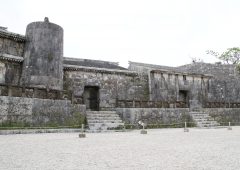 2024.07.07
2024.07.07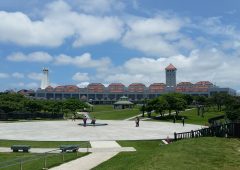 2024.06.21
2024.06.21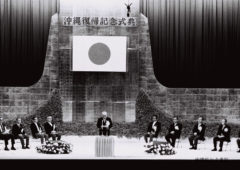 2024.05.15
2024.05.15 2024.02.07
2024.02.07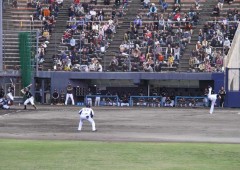 2024.01.31
2024.01.31 2023.11.02
2023.11.02 2023.10.26
2023.10.26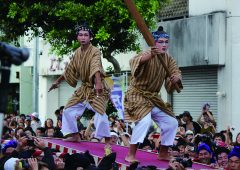 2023.09.29
2023.09.29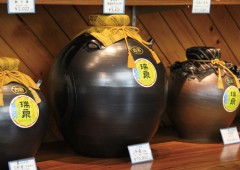 2023.09.01
2023.09.01






